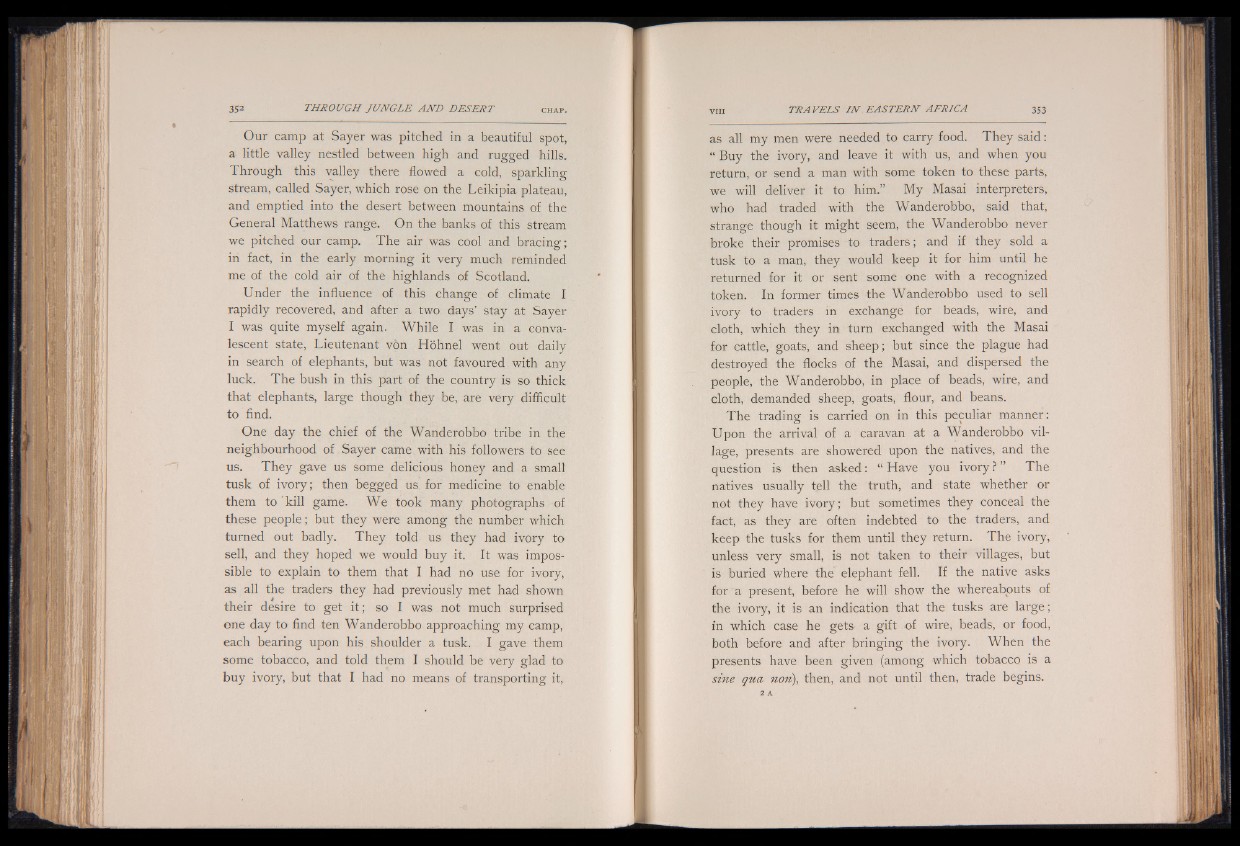
Our camp at Sayer was pitched in a beautiful spot,
a little valley nestled between high and rugged hills.
Through this valley there flowed a cold, sparkling
stream, called Sayer, which rose on the Leikipia plateau,
and emptied into the desert between mountains of the
General Matthews range. On the banks of this stream
we pitched our camp. The air was cool and bracing;
in fact, in the early morning it very much reminded
me of the cold air of the highlands of Scotland.
Under the influence of this change of climate I
rapidly recovered, and after a two days’ stay at Sayer
I was quite myself again. While I was in a convalescent
state, Lieutenant von Hohnel went out daily
in search of elephants, but was not favoured with any
luck. The bush in this part of the country is so thick
that elephants, large though they be, are very difficult
to find.
One day the chief of the Wanderobbo tribe in the
neighbourhood of Sayer came with his followers to see
us. They gave us some delicious honey and a small
tusk of ivory; then begged us for medicine to enable
them to 'kill game. We took many photographs of
these people; but they were among the number which
turned out badly. They told us they had ivory to
sell, and they hoped we would buy it. It was impossible
to explain to them that I had no use for ivory,
as all the traders they had previously met had shown
their desire to get it; so I was not much surprised
one day to find ten Wanderobbo approaching my camp,
each bearing upon his shoulder a tusk. I gave them
some tobacco, and told them I should be very glad to
buy ivory, but that I had no means of transporting it,
as all my men were needed to carry food. They said:
“ Buy the ivory, and leave it with us, and when you
return, or send a man with some token to these parts,
we will deliver it to him.” My Masai interpreters,
who had traded with the Wanderobbo, said that,
strange though it might seem, the Wanderobbo never
broke their promises to traders; and if they sold a
tusk to a man, they would keep it for him until he
returned for it or sent some one with a recognized
token. In former times the Wanderobbo used to sell
ivory to traders in exchange for beads, wire, and
cloth, which they in turn exchanged with the Masai
for cattle, goats, and sheep; but since the plague had
destroyed the flocks of the Masai, and dispersed the
people, the Wanderobbo, in place of beads, wire, and
cloth, demanded sheep, goats, flour, and beans.
The trading is carried on in this peculiar manner:
Upon the arrival of a caravan at a Wanderobbo village,
presents are showered upon the natives, and the
question is then asked: “ Have you ivory ? ” The
natives usually tell the truth, and state whether or
not they have ivory; but sometimes they conceal the
fact, as they are often indebted to the traders, and
keep the tusks for them until they return. The ivory,
unless very small, is not taken to their villages, but
is buried where the elephant fell. If the native asks
for a present, before he will show the whereabputs of
the ivory, it is an indication that the tusks are large;
in which case he gets a gift of wire, beads, or food,
both before and after bringing the ivory. When the
presents have been given (among which tobacco is a
sine qua non), then, and not until then, trade begins.